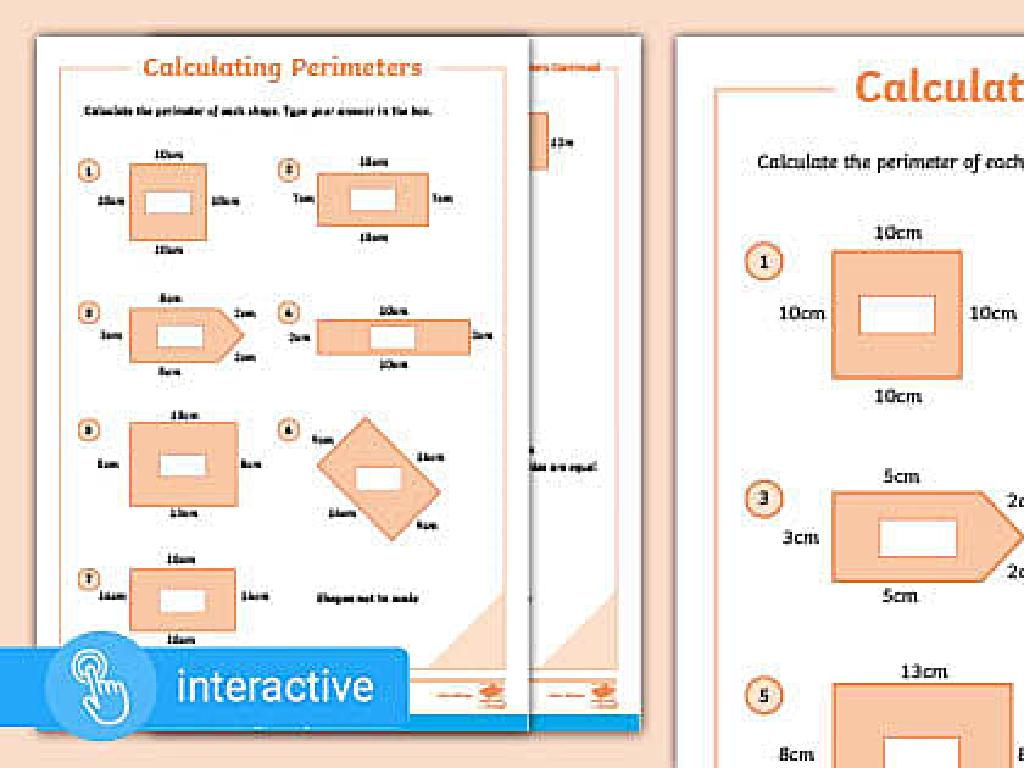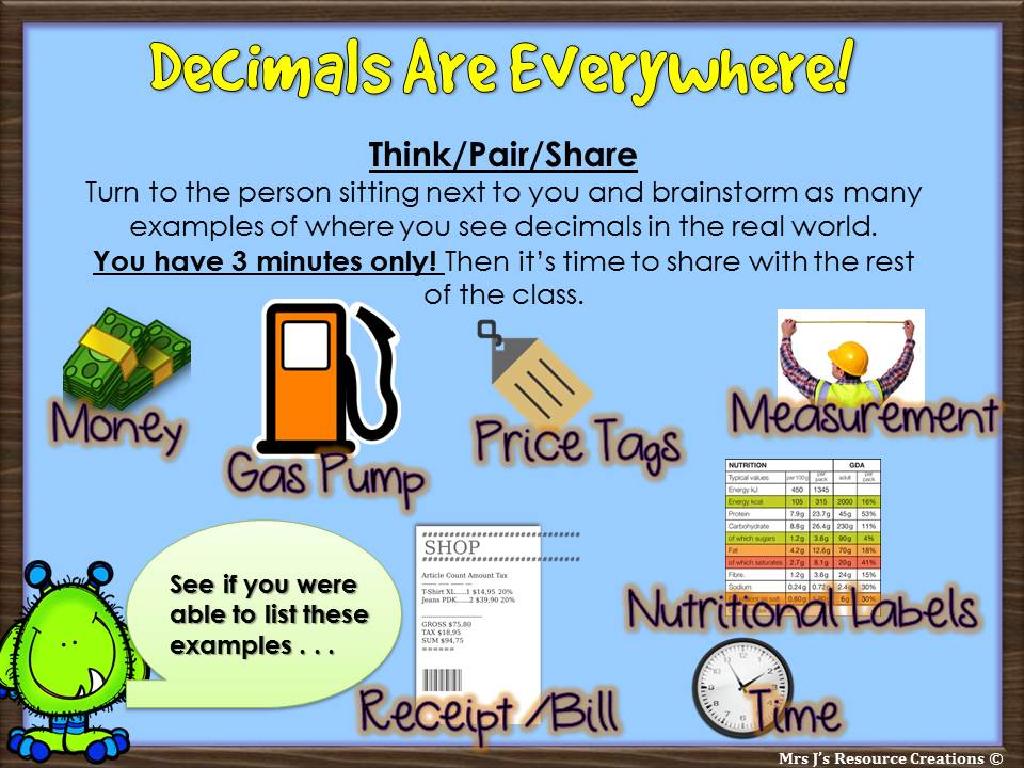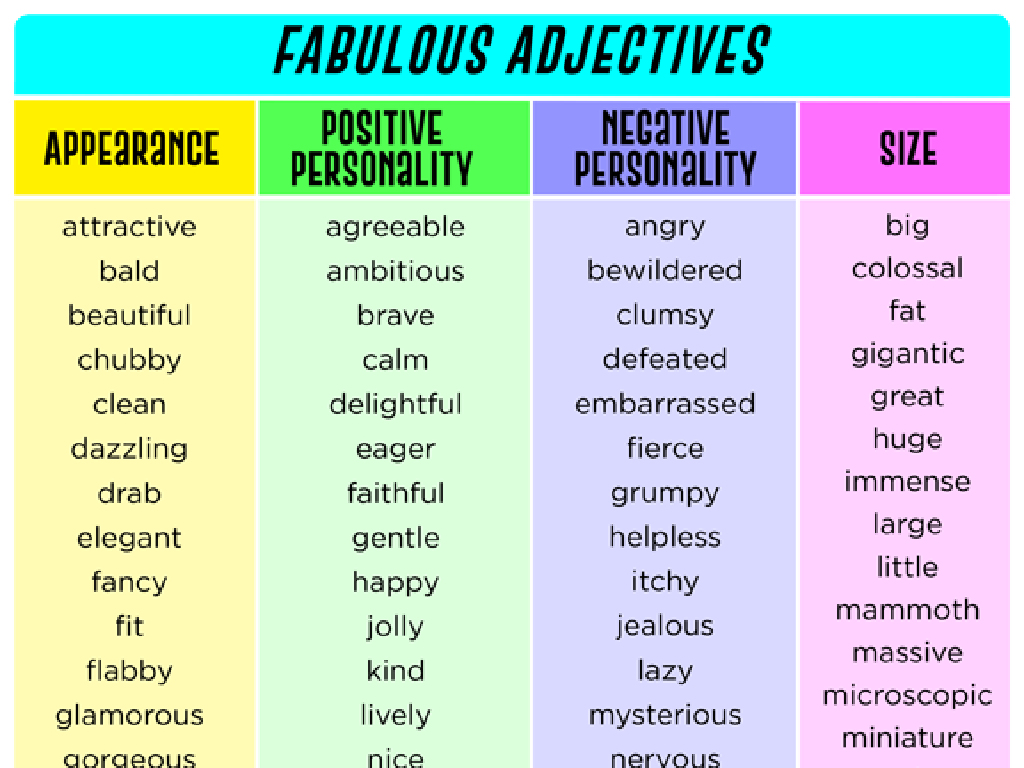Read About Science And Nature
Subject: Language arts
Grade: Third grade
Topic: Informational Texts: Level 2
Please LOG IN to download the presentation. Access is available to registered users only.
View More Content
Exploring Science & Nature Through Reading
– What are informational texts?
– Texts that explain real-world facts and concepts.
– Learning science from texts
– Discover facts about plants, animals, and ecosystems.
– Nature insights from reading
– Understand weather, seasons, and natural phenomena.
– Engaging with texts actively
|
This slide introduces students to informational texts and their importance in learning about science and nature. Informational texts are non-fiction and provide factual information about the world. They can cover a wide range of topics, including science and nature. Through these texts, students can learn about various scientific concepts and natural elements such as plants, animals, weather patterns, and more. Encourage students to think critically and ask questions while reading. Activities can include identifying the main idea, looking for specific details about a topic, or summarizing a section of text. The goal is to foster curiosity and enhance comprehension of the natural world through reading.
Exploring Informational Texts
– What are informational texts?
– Texts that give facts about topics like science and nature.
– Purpose: Inform, not entertain
– Different from stories and tales
– Examples: Textbooks, news articles
– Encyclopedias and scientific journals also count.
|
Informational texts are a key component of learning, especially in subjects like science and nature. They provide students with factual information and help them understand the world around them. Unlike narrative texts that tell a story, informational texts are designed to educate. Examples of informational texts include textbooks, which provide structured knowledge on a subject; encyclopedias, which offer in-depth information on a wide range of topics; news articles, which inform about current events; and scientific journals, which present new research findings. Encourage students to think about how these texts can help them learn about science and nature. Discuss the features of informational texts, such as headings, tables of contents, glossaries, and indexes, which help readers locate and understand information.
Exploring Science Through Reading
– Discovering the world via science
– Science helps us learn about Earth’s mysteries.
– Reading about nature’s wonders
– Explore topics like plants, animals, weather, and space.
– Informational texts: our fact guides
– These texts provide real facts and data.
– Understanding plants, animals, and more
– Gain better insight into various scientific topics.
|
This slide aims to spark curiosity among third-grade students about the natural world through the lens of science. By reading informational texts, students can learn about different aspects of science and nature, such as the life cycles of plants and animals, the forces behind weather patterns, and the vastness of space. These texts are designed to present information in an engaging and factual manner, helping students to build a foundation of knowledge. Encourage students to think of questions they have about the world and look for answers in their reading. The goal is to foster a love for learning and an appreciation for the scientific method of inquiry.
The Wonders of Nature
– Nature’s amazing variety
– From tiny bugs to vast oceans
– Adventures through reading
– Travel in books without leaving class
– Discover the water cycle
– How water moves on Earth
– Explore ecosystems
– How plants and animals live together
|
This slide aims to spark curiosity about the natural world among third-grade students. Emphasize the diversity of nature, from the smallest creatures to the largest bodies of water. Explain how informational texts allow us to embark on adventures by reading, which is a safe and accessible way to explore new concepts. Introduce the water cycle as a fundamental environmental process and discuss different ecosystems to illustrate the interdependence of living organisms and their habitats. Encourage students to think of questions they have about nature and what they hope to learn from reading about it. This will set the stage for engaging and interactive lessons on science and nature.
Exploring Features of Informational Texts
– Headings guide our reading
Like a chapter title, a heading tells us what a section is about.
– Captions explain pictures
Captions under photos or diagrams provide more details.
– Glossaries define words
A glossary is a mini-dictionary in the back of the book.
– Examples show usefulness
We’ll see how these features help us understand science and nature topics.
|
This slide introduces students to the specific features of informational texts that aid in comprehension, particularly within the context of science and nature. Headings help students anticipate what they will learn in each section. Captions add context to images, making them more informative. Glossaries support vocabulary development by defining new or subject-specific words. Use examples from actual informational texts on science and nature to illustrate these points. Encourage students to discuss how these features have helped them in their own reading and to always look for these clues when learning from informational texts.
Exploring Science & Nature: Reading Strategies
– Identify keywords in the text
– Keywords help us grasp the main ideas, like ‘habitat’ or ‘species’.
– Ask questions while reading
– What does this word mean? Why is the rainforest important?
– Summarize the information
– After reading, tell the main points in your own words.
– Practice with a rainforest text
– We’ll read about rainforests and apply these strategies.
|
This slide introduces students to effective reading strategies for informational texts, focusing on science and nature topics. Emphasize the importance of identifying keywords that are central to understanding the text’s main ideas. Encourage students to actively engage with the text by asking questions, which fosters curiosity and comprehension. Summarizing helps students process and remember what they’ve read. Use a short text about rainforests to practice these strategies in class, guiding students through the process and discussing their findings. This hands-on approach will help solidify their learning and enhance their reading skills.
Nature Scavenger Hunt Activity
– Engage in a scavenger hunt
– Use checklist to find nature items
– Find items like leaves, rocks, or insects
– Work in pairs to explore
– Share an interesting fact
– Each pair presents a fact about one item
|
This class activity is designed to combine outdoor fun with educational learning about nature. Provide students with a checklist of items to find outside, such as different types of leaves, rocks, or small insects. Encourage them to read about each item on their checklist, either through provided materials or a classroom discussion beforehand. Working in pairs allows for collaborative learning and ensures safety during the outdoor activity. After the scavenger hunt, each pair will share an interesting fact they learned about one of the items they found. This reinforces their reading comprehension and presentation skills. Possible variations of the activity could include drawing the items found, writing a short paragraph about the experience, or even creating a small project based on the items collected.






